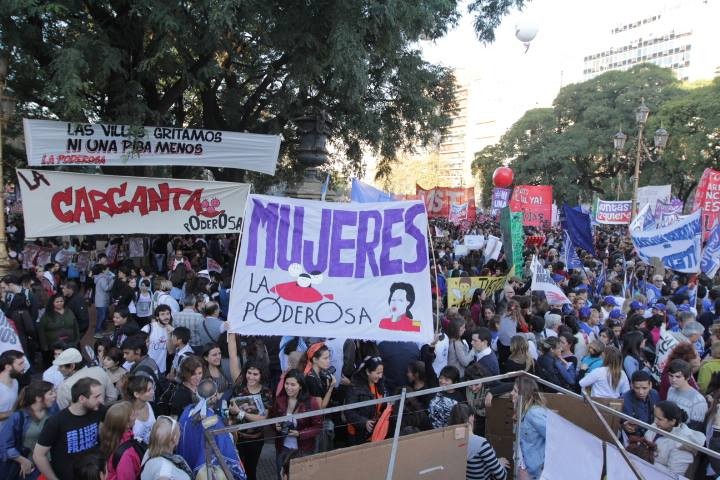By Ashoka Jegroo for Waging Nonviolence
Thousands of protesters marched on June 3 in Buenos Aires and dozens of other cities across Argentina against violence towards women.
Shortly before 5 p.m. on Wednesday, massive crowds of protesters gathered in the Dos Congresos square outside of the National Congress in Buenos Aires. Almost 200,000 people, according to Argentine news agency Telam, participated in the march. The protesters demanded an end to gender violence in the country, and the organizers asked politicians in attendance to sign a five-point promise to put an end to femicide.
“Femicide is the most extreme form of violence that crosses every social class, beliefs or ideas,” organizers read from a statement on stage outside of Argentina’s Congress according to the Buenos Aires Herald. “But femicide is also a political concept. It’s the word that reveals the way in which a society sees something as natural when it isn’t: sexist violence.”
The march in Buenos Aires was joined by protests in over 70 cities across Argentina, as well as solidarity protests in Santiago, Chile, Montevideo, Uruguay, and Miami, Florida under the hashtag #NiUnaMenos (Not One Woman Less). Even Argentina’s conservative president Cristina Kirchner and conservative Buenos Aires mayor and presidential candidate Mauricio Macri showed their support for the march on social media. Meanwhile, other politicians came out to march — even though many protesters blame the government and other institutions in Argentine society for enabling gender violence.
“The fact that politicians and members of government came out to the plaza in support is like Shell protesting contamination in the Arctic,” protester Clara Modens told VICE News. “It doesn’t make sense. They are the ones who are responsible.”
While organizers had been planning to have a demonstration for months, the protests were sparked in part by last month’s murder of 14-year-old Chiara Paez by her 16-year-old boyfriend Manuel Mansilla. Mansilla confessed to beating and killing his girlfriend and burying her body in the backyard of his home in Rufino in Argentina’s Santa Fe province. An autopsy also revealed that Paez was actually three-months pregnant, and Mansilla is suspected of killing her over a disagreement about whether Paez would get an abortion or not. The case sparked outrage amongst the public in a country struggling to tackle the problem of femicide and gender violence.
“Chiara’s case was heartbreaking, but that’s not the only reason why we are here,” protester Gladys Roldán told the Buenos Aires Herald. “I brought my daughter because I want her to be aware of what is going on.”
There are no official statistics kept on the number of femicides in Argentina, but according to counts done by women’s rights group La Casa del Encuentro, a woman is killed every 31 hours by a family member, a partner or a former partner. One of the demands on the five-point promise written by organizers is for the government to start keeping official records on the number of femicides.
Argentina passed Law 26485 in 2009 to address violence against women, but protesters claim that the law was not enough and was not fully implemented. Government officials claimed this was due to budget shortages.
“We need official statistics to develop effective policies and an adequate budget to implement these policies,” Mabel Bianco, president of the Foundation for the Study and Research on Women in Buenos Aires, told USA Today.
According to the World Health Organization, as many as 38 percent of murders of women across the globe are committed by an intimate partner. A 2012 study done by the Small Arms Survey, a research organization in Geneva that tracks armed violence, showed that despite Argentina’s alarming femicide statistics, the country isn’t even one of the 25 countries with the highest femicide rates. Though the numbers are hard to come by in many countries, El Salvador, Jamaica and Guatemala top the list.
In Argentina, though, protesters want to make sure that perpetrators of gender violence are no longer allowed to go on committing acts of violence towards women without any consequences.
“The judges, the sentences, that’s what’s the most important,” protester Cristina Hermoa told EuroNews. “Because today people kill and tomorrow they are free, and the next day they go on killing. They keep killing because nothing happens.”






